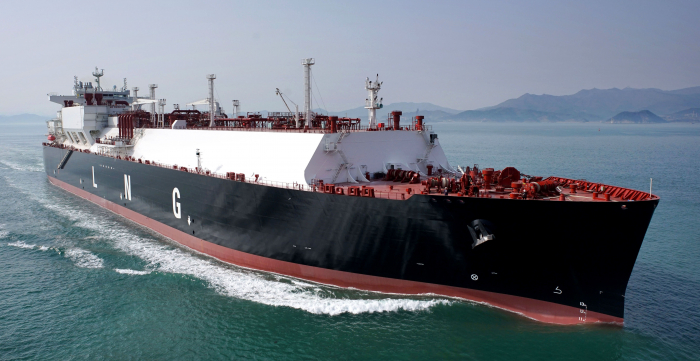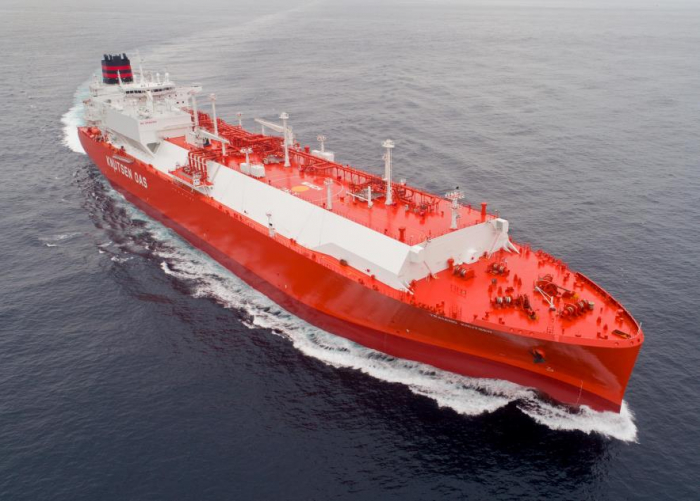Korean shipyards jittery about $20 bn in Qatar LNG ship orders
QatarEnergy is understood to refuse any increase in the contract price, agreed upon in June 2020
By May 16, 2022 (Gmt+09:00)
LG Chem to sell water filter business to Glenwood PE for $692 million


Kyobo Life poised to buy Japan’s SBI Group-owned savings bank


KT&G eyes overseas M&A after rejecting activist fund's offer


StockX in merger talks with Naver’s online reseller Kream


Mirae Asset to be named Korea Post’s core real estate fund operator



South Korea’s Big Three shipbuilders are on edge about their orders totaling $20 billion from QatarEnergy as the state-run company is refusing to raise their contract price agreed upon two years ago, despite soaring steel plate and other raw material prices, according to industry sources.
Back in June 2020, Hyundai Heavy Industries Co., Daewoo Shipbuilding & Marine Engineering Co. and Samsung Heavy Industries Co. signed a deed of agreement (DOA) with QatarEnergy to build about 100 LNG carriers worth a combined 70 billion riyal, or 24.6 trillion won ($20 billion).
The first batch of orders was placed for six LNG ships last November, consisting of four vessels from Daewoo and two from Samsung.
For the remaining ships, the three shipyards were supposed to sign final agreements on the DOA in phases, starting from early this month through 2027. But the signing is being delayed as they have yet to narrow differences over detailed terms.
If the LNG carriers are delivered at the agreed-upon price, Korean shipbuilders may have to shoulder about 60 billion won in losses from each ship they build for QaterEnergy, according to industry insiders.
Additionally, Qatar Energy is calling on the Korean shipbuilders to add new eco-friendly features to meet stricter environmental regulations.
That would further burden the three big shipbuilders reeling from operating losses in excess of 1 trillion won in 2021, respectively.
ASKED TO SUBMIT A DEED OF AGREEMENT COPY
To add to their worries, the Korea Development Bank and the Export-Import Bank of Korea early this month called on the three shipbuilders to submit a copy of their DOA for the LNG ship orders.
It is very rare for banks to make such a request before a shipbuilder inks a final contract with a shipper.
They typically request shipbuilders to hand in a DOA copy so that they provide refund and repayment guarantees to a shipper, in case the shipbuilder fails to deliver the vessel, or goes bankrupt.
“While checking whether or not the Qatari company is making an unreasonable demand, we also want to know whether some shipbuilders won the orders at bargain prices,” a financial industry source told The Korea Economic Daily.
The three Korean shipyards did not disclose specific values of the Qatari orders. They are now scratching their heads over whether or not to comply with the banks’ demands, according to the industry sources.

Newbuilding prices of vessels have spiked since 2020 on the back of global supply chain disruptions exacerbated by the COVID-19 pandemic.
The overall Clarkson Newbuilding Price Index has soared 24% to its 13-year high of 157.8 points as of April 2022, compared with mid-2020 levels. Steel plates for use in vessels have doubled to 1.2 million won per ton since 2020.
But Qatar Energy is said to argue that the DOA contained a clause that the shipbuilding price would be based on the price at the time when they signed the preliminary agreement in June 2020.
Market speculation is that the Korean shipbuilders, struggling with a dearth of orders, might offer lower prices to secure the large-scale contracts.
For its part, Hyundai Heavy’s holding company Korea Shipbuilding & Offshore Engineering Co. (KSOE) played down the impact of the Qatari order on its balance sheet.
Last month, a KSOE official said at a presentation that the order from QatarEnergy would be executed in phases through 2027, thus possible losses from the contract will not be reflected in its books all at once.
The company added that the shipbuilding price had been set above the then-market price.
EXPOSURE TO RUSSIA
The three Korean shipbuilders are also at risk of not receiving a combined $8.05 billion from Russia due to sanctions imposed against the country following its war on Ukraine.
Among them, Samsung Heavy has the biggest exposure of $5 billion for ships and offshore plant orders from Russia, followed by Daewoo Shipbuilding's $2.5 billion and Hyundai Heavy's $550 million.
Write to Kyung-Min Kang at kkm1026@hankyung.com
Yeonhee Kim edited this article.
-
 Shipping & ShipbuildingBig 3 Korean shipbuilders win largest orders in 8 yrs
Shipping & ShipbuildingBig 3 Korean shipbuilders win largest orders in 8 yrsDec 31, 2021 (Gmt+09:00)
2 Min read -
 Shipping & ShipbuildingKorean shipbuilders win record LNG carrier orders; 2022 outlook bright
Shipping & ShipbuildingKorean shipbuilders win record LNG carrier orders; 2022 outlook brightDec 08, 2021 (Gmt+09:00)
2 Min read -
 Shipping & ShipbuildingDaewoo Shipbuilding, Samsung Heavy win LNG carriers order from Qatar
Shipping & ShipbuildingDaewoo Shipbuilding, Samsung Heavy win LNG carriers order from QatarNov 08, 2021 (Gmt+09:00)
1 Min read


